鲁教版八年级下册Unit2 It's a nice day, isn't itSectionB1a-
鲁教版八年级英语下册Unit2 It's a nice day, isn't it -Section A 3a-3c课件
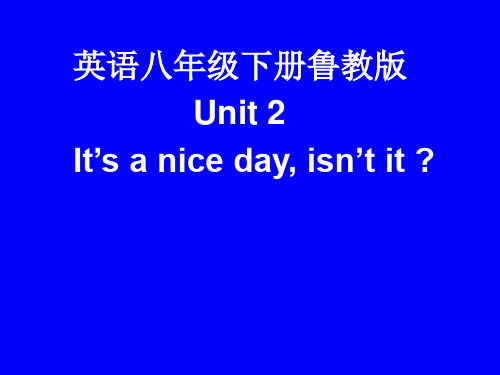
anyone there.
para2
What happened when Ben tried to talk to Tania?
Ben
Tania
First
_in_t_ro_d_u_c_e_d_ _h_im__se_l_f _r_e_p_li_e_d_ _sh_y_l_y_
retell para 3
is to______________________ ______________________.
a good starting point
or ____________________ ____________.
can ____________________ ____________.
a good starting point
or __ta_l_k_a_b_o_u_t_s_o__m_e_t_h_in_g__ _y_o__u_b_o_t_h_l_ik_e_.
can __m__a_k_e_s_o_c_i_a_l _s_it_u_a_ti_o_n_s __m_o_r_e_r_e_la_x_e_d_.
This is a really good party, isn’t it? You are a friend of David’s, aren’t you?
It’s a nice day, isn’t it? It looks like rain, doesn’t it?
The food is so delicious ,isn’t it ? I like the seafood, what about you?
鲁教版英语八年级下Unit2 It’s a nice day, isn’;t it (2)
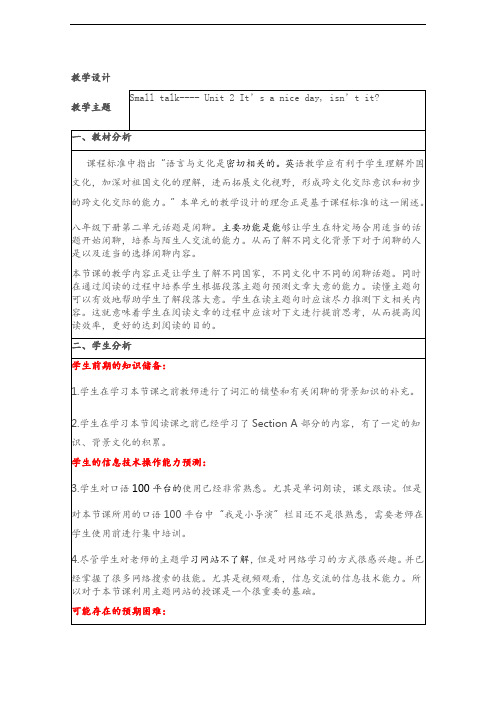
教学设计Small talk---- Unit 2 It’s a nice day, isn’t it?教学主题一、教材分析课程标准中指出“语言与文化是密切相关的。
英语教学应有利于学生理解外国文化,加深对祖国文化的理解,进而拓展文化视野,形成跨文化交际意识和初步的跨文化交际的能力。
”本单元的教学设计的理念正是基于课程标准的这一阐述。
八年级下册第二单元话题是闲聊。
主要功能是能够让学生在特定场合用适当的话题开始闲聊,培养与陌生人交流的能力。
从而了解不同文化背景下对于闲聊的人是以及适当的选择闲聊内容。
本节课的教学内容正是让学生了解不同国家,不同文化中不同的闲聊话题。
同时在通过阅读的过程中培养学生根据段落主题句预测文章大意的能力。
读懂主题句可以有效地帮助学生了解段落大意。
学生在读主题句时应该尽力推测下文相关内容。
这就意味着学生在阅读文章的过程中应该对下文进行提前思考,从而提高阅读效率,更好的达到阅读的目的。
二、学生分析学生前期的知识储备:1.学生在学习本节课之前教师进行了词汇的铺垫和有关闲聊的背景知识的补充。
2.学生在学习本节阅读课之前已经学习了Section A 部分的内容,有了一定的知识、背景文化的积累。
学生的信息技术操作能力预测:3.学生对口语100平台的使用已经非常熟悉。
尤其是单词朗读,课文跟读。
但是对本节课所用的口语100平台中“我是小导演”栏目还不是很熟悉,需要老师在学生使用前进行集中培训。
4.尽管学生对老师的主题学习网站不了解,但是对网络学习的方式很感兴趣。
并已经掌握了很多网络搜索的技能。
尤其是视频观看,信息交流的信息技术能力。
所以对于本节课利用主题网站的授课是一个很重要的基础。
可能存在的预期困难:5.对于开放性较强的网络教学环境,教师能不能很好的宏观调控好学生,对教师来讲是一个很大的挑战。
需要加强网络监管。
三、教学目标基于这样的教学分析确定教学目标:知识技能目标:1. 能找到每段的标题。
鲁教版八下 Unit2 课文翻译
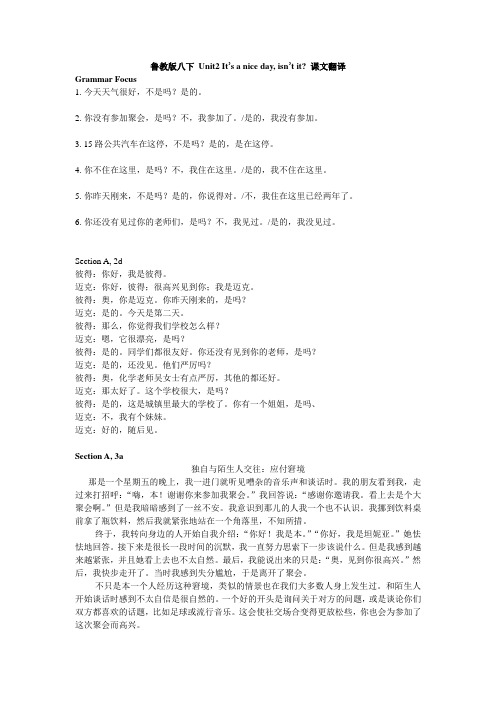
鲁教版八下Unit2 It’s a nice day, isn’t it? 课文翻译Grammar Focus1.今天天气很好,不是吗?是的。
2.你没有参加聚会,是吗?不,我参加了。
/是的,我没有参加。
3. 15路公共汽车在这停,不是吗?是的,是在这停。
4.你不住在这里,是吗?不,我住在这里。
/是的,我不住在这里。
5.你昨天刚来,不是吗?是的,你说得对。
/不,我住在这里已经两年了。
6.你还没有见过你的老师们,是吗?不,我见过。
/是的,我没见过。
Section A, 2d彼得:你好,我是彼得。
迈克:你好,彼得;很高兴见到你;我是迈克。
彼得:奥,你是迈克。
你昨天刚来的,是吗?迈克:是的。
今天是第二天。
彼得:那么,你觉得我们学校怎么样?迈克:嗯,它很漂亮,是吗?彼得:是的。
同学们都很友好。
你还没有见到你的老师,是吗?迈克:是的,还没见。
他们严厉吗?彼得:奥,化学老师吴女士有点严厉,其他的都还好。
迈克:那太好了。
这个学校很大,是吗?彼得:是的,这是城镇里最大的学校了。
你有一个姐姐,是吗、迈克:不,我有个妹妹。
迈克:好的,随后见。
Section A, 3a独自与陌生人交往:应付窘境那是一个星期五的晚上,我一进门就听见嘈杂的音乐声和谈话时。
我的朋友看到我,走过来打招呼:“嗨,本!谢谢你来参加我聚会。
”我回答说:“感谢你邀请我。
看上去是个大聚会啊。
”但是我暗暗感到了一丝不安。
我意识到那儿的人我一个也不认识。
我挪到饮料桌前拿了瓶饮料,然后我就紧张地站在一个角落里,不知所措。
终于,我转向身边的人开始自我介绍:“你好!我是本。
”“你好,我是坦妮亚。
”她怯怯地回答。
接下来是很长一段时间的沉默,我一直努力思索下一步该说什么。
但是我感到越来越紧张,并且她看上去也不太自然。
最后,我能说出来的只是:“奥,见到你很高兴。
”然后,我快步走开了。
当时我感到失分尴尬,于是离开了聚会。
不只是本一个人经历这种窘境,类似的情景也在我们大多数人身上发生过。
鲁教版八年级英语下册精品课件Unit 2It's a nice day, isn't it ?SectionB1a-2a-2e

After reading Let's do a summary
• Before the summary , let Ss read the whole article in silence ,then complete the summary
Small talk • __________is relaxed dialog that helps pass the time people_____________when they meet Empty silences others. _______________often make us ____________ so this is a way of feel nervous filling ________ those periods. You can make small talk when waiting in line an airport bus stop It makes others at_________or _______. feel relaxed _______and it ________________. passes time nicely • For some, small talk is a _____________of _____________. common form communication Business travelers ,__________ workers in shops or restaurants usually make small talk .
• • • •
1.Cultural differences D 2.Cultural similarities C 3.What is small talk ? A 4.What should we talk about E 5.An everyday activity B
鲁教版英语八年级下Unit2 It’s a nice day, isn’;t it SectionA (1)
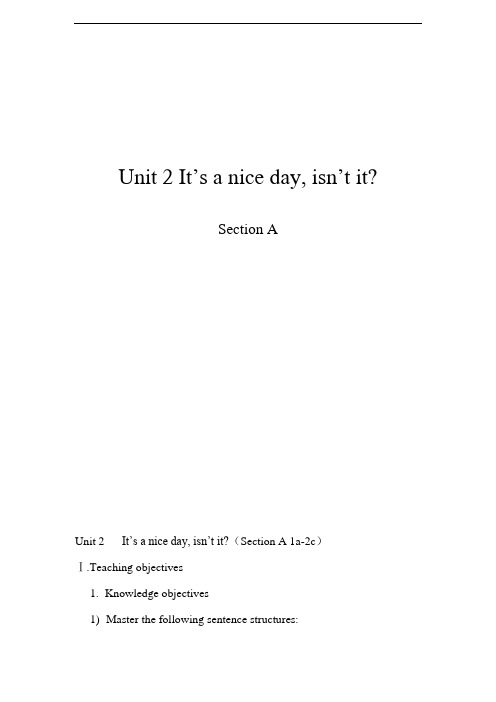
Unit 2 It’s a nice day, isn’t it?Section AUnit 2 It’s a nice day, isn’t it?(Section A 1a-2c)Ⅰ.Teaching objectives1.Knowledge objectives1)Master the following sentence structures:A: It’s a nice day, isn’t it?B: Yes, it is. I really love hot weather.A: You love violin music, don’t you?B: Yes, I do.A: It looks like rain, doesn’t it?B: Yes, it does. And I forget my umbrella.A: Do you think it will stop by noon?B: I hope so.2)Master the following words:by, noon, bus, train, weather, rain, umbrella, party2.Ability objectives1)Learn to understand the meaning of Tag Questions.2)Learn to make small talk.3.Enotion objectivesLearn to care about people by making small talk with strangers.Ⅱ.Teaching points and difficulties1.Teaching pointsLearn to make small talk.2.Teaching difficultiesThe use of Tag Questions.Ⅲ.Teaching MethodsTask-based approachⅣ.Teaching aidsMultimedia, recorderⅤ.Teaching proceduresStep one: GreetingsT: Good morning, boys and girls! S: Good morning, Miss He.T: How are you today? S: Fine.T: It’s a nice day, isn’t it? S: Yes, it is.T: I t’s spring now, isn’t it? S: Yes, it is.T: You love spring, don’t you? S: Yes, I do.…….T: As we know each other, so it’s easy for us to start a talk. If you don’t know me,and I don’t know you, will you talk with me? In our country, our parents always tell us: “Don’t talk to people you don’t know.” However, in some foreign countries, parents teach their children how to talk with strangers. And we call this kind of talk “small talk.”Step two:Before listeningT: Have you ever talked with people you don’t know?S: Yes.T: Where would you talk to people you don’t know?S: on a bus, at a bus stop, at a party,in a park,…T: What do you usually talk about?(weather? Sports?movie?)Different countries have different cultures. In our country, when wemeet each other,we usually ask: “Hey, did you have your lunch/dinner?”, and sometimes we ask people’s age. But in foreign countries, it’s not polite to ask people’s age. Then, what do they usually talk about?S:……T: Now let’s listen and see where and what they usually talk.Step three: While listening1. Listen and number the pictures in the order you hear them.2. Check the answers.3. Listen again and fill in the blanks. Use the key words to guess where and what they talk.4. Pair work. Ss work in pairs to make small talk with Tag Questions.5. Listen and imitate the Tag Questions.6.T: Make small talk with people you don’t know sometimes can be very successful, both of you feel enjoyable and you want to talk more with each other. And also sometimes can be unsuccessful, for example, you are not interested in what he says, so you just don’t want to go on talking with him. You want to stop the talk by giving him a very short answer or just keeping silent. Listen to the three conversations. Are they examples of successful or unsuccessful conversations.7. Check the answers8. Listen to conversation 3 again. Put the sentences and questions in order.9. Check the answers by asking two pairs of Ss to read their conversations.10. Listen and imitate.Step four: After listeningGroup work: Ss work in groups to role play a small talk.(some topics will be given)Step five: SummaryUse the mind map to sum up what we have learnt.Step six: Homework.1. Listen and imitate.2. Level A: Collect tag questions about weather, traffic, pop stars,etc.Level B: imagine you are at a party. Write small talk conversations and practice them with your partner.Blackboard Design:Unit 2 It’s a nice day, isn’t it?small talkWhere? (situations)on a bus, at a party, in a park...What? (topics)weather,favourite things,TV shows, sports......age,money,family problems ......How?(structures)A: The train is always late,isn't it?B: Yes, it is.A: It looks like rain, doesn't it?B: Yes, it does.A: Do you like movies?......。
鲁教版(五四制)英语 八年级下册 Unit 2 It's a nice day isn't it_
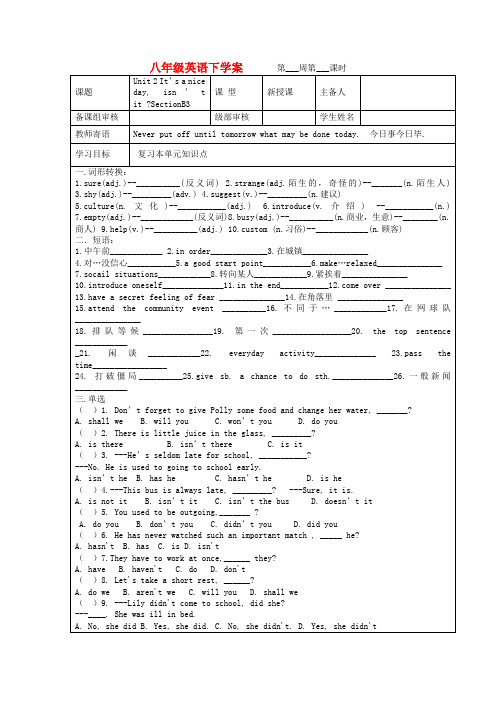
A. is there B. isn’t there C. is it
( )3. ---He’s seldom late for school, ___________?
---No. He is used to going to school early.
A. isn’t he B. has heC. hasn’t heD. is he
C. How to be Good NeighboursD. My Neighbours
五.适当形式填空
1.The twins' favourite subject is _______ (化学).
2. Are you quite shy when you speak with _______ (陌生人)?
10.introduce oneself______________11.in the end___________e over _______________
13.have a secret feeling of fear _______________14.在角落里 _______________
学习目标
复习本单元知识点
一.词形转换:
1.sure(adj.)--__________(反义词) 2.strange(adj.陌生的,奇怪的)--_______(n.陌生人) 3.shy(adj.)--_________(adv.) 4.suggest(v.)--_________(n.建议)
鲁教版八年级英语下册 《Unit2 It's a nice day, isn't it》课件

C. _________________ People make small talk in almost every country.
D. _________________ Things we should not discuss can also depend on culture. E. _________________ Therefore, we should usually discuss “safe” subject like the weather, which is common in many cultures.
[‘ð文,回答下列问题。 预测下列问题的答案会在哪一段中 .
E What do people often talk about in England? Why? Para ___: Weather. Because it changes so much. A How does small talk make other people feel? Para ___: Small talk makes other people feel relaxed. Para ___: B What kind of people use small talk in their jobs? Business travelers and workers in shops or restaurants. Para ___: D Which common questions in China might not be right for other countries? Have you eaten yet? Do you have any children? C Which rules of small talk are the same in most cultures? Para ___: It’s important to smile and keep the conversation light and humorous. [‘hjuːm(ə)rəs] 幽默的 A Where do people often make small talk? Para ___: At an airport or bus stop.
鲁教版英语八年级下册Unit 2 Its a nice day isnt it Section
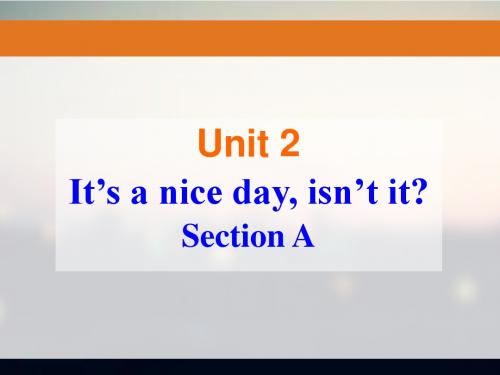
Conversation 3
Boy: The train is late, isn’t it?
Man: No, today is Sunday. The trains
only run twice an hour on Sunday.
Boy: Oh, I didn’t know that. I usually
take the train on weekdays.
Man: Oh, do you take the train to school? Boy: Yes, I do.
2b Listening
Listen to conversation 3 again.
Put the sentences and questions
below in order.
a. I hope so. I want to go swimming. b. Yes. It rains every Saturday! c. At Franklin Lake. d. Oh? Where do you swim? e. Do you think it’ll stop by noon? f. It always rains on the weekend, doesn’t it? g. Do you ever go there?
evening.
2c Pair work
Imagine you are at a bus stop. Make your own small talk. You can use the expressions in the box below. It’s really cold today, isn’t it? The No. 15 bus stops here, doesn’t it? A: It’s really cold today, isn’t it? B: Yes, it is. I hope the bus comes soon.
鲁教版英语八下Unit 2《It’s a nice day, isn’t it》ppt课件1
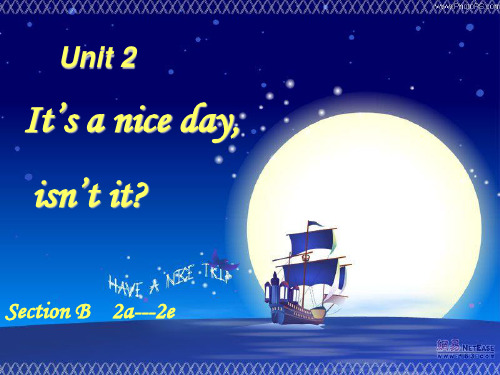
Useful phrases on Page 14 :
发现闲聊有用 招待顾客 保持对话轻松 幽默 依赖于文化 (与……)结婚 对某人来说似 乎很奇怪 给某人一个机 会做某事
find small talk helpful serve customers keep the conversation light and humorous depend on culture be married( to …) seem strange to sb.
Though the things (that)we talk about are not usually important, small talk itself is(not important).
尽管我们讨论的事情通常不重要, 但闲谈本身就是如此。
Things (that) we should not discuss can also depend on culture. 我们不应该讨论的事情也会 依据文化而异。
因此他们应该被避免。
此句为含有情态动词的被动语态。 结构: can/must/should/may + be+ done Your homework must ____________ be finished (finish) this afternoon.
They might be asked about how they got to the meeting.他们可能会被询问怎 样到达会议地点。
Don’t talk loudly when/while you _________ are reading (read) in the library. reading (read) in Don’t talk loudly while _________ the library.
(精品)2016春鲁教版英语八下Unit2《It’saniceday,isn’tit》
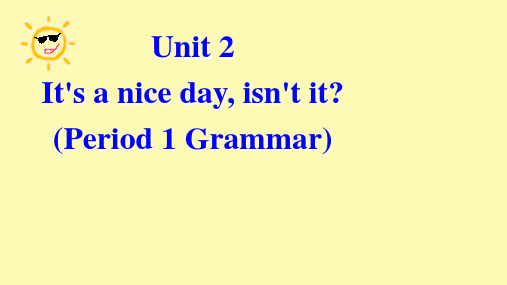
• 7. Amy is going to the zoo this
Saturday,
isn’t she ?
• 8. He likes apples, doesn’t he ?
• 9. There were lots of trees here last year, weren’t the?re
• 10. They didn’t go to Dalian yesterday, did they ?
It rained heavily yesterday, _d_id_n_’_t_i_t? Yes, it did.
Li lei fell down, _d_i_d_n_’_t_h_e__? Yes, he did.
There was a heavy snow last year, _w_a_s_n_’_t_t_h_e_r_e_? Yes, there was.
It’s cold in the picture,_i_s_n_’t__it_? Yes, it is.
It is an apple, isn’t it ? Yes, it is.
They are apples, aren’t they? Yes, they are.
They play football, _d_o_n__’t_t_h_e_y_? Yes, they do.
1. You aren’t an actor, _a_r_e_ y_o_u? 2. He isn’t a good boy, _i_s_h_e_? 3. It wasn’t fine yesterday, _w_a_s_it_ ? 4. It doesn’t rain here, _d_o_e_s _it_ ? 5. His sister doesn’t have a headache,
鲁教版英语八年级下册:Unit2 It's a nice day,isn't it. Section
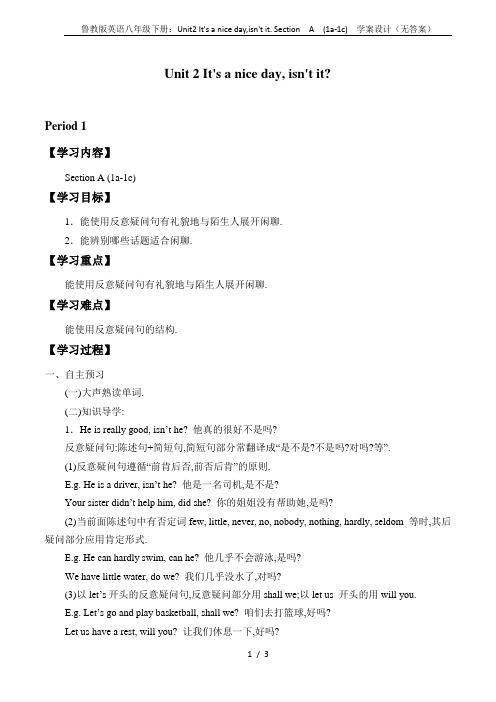
Unit 2 It's a nice day, isn't it?Period 1【学习内容】Section A (1a-1c)【学习目标】1.能使用反意疑问句有礼貌地与陌生人展开闲聊.2.能辨别哪些话题适合闲聊.【学习重点】能使用反意疑问句有礼貌地与陌生人展开闲聊.【学习难点】能使用反意疑问句的结构.【学习过程】一、自主预习(一)大声熟读单词.(二)知识导学:1.He is really good, isn’t he? 他真的很好不是吗?反意疑问句:陈述句+简短句,简短句部分常翻译成“是不是?不是吗?对吗?等”.(1)反意疑问句遵循“前肯后否,前否后肯”的原则.E.g. He is a driver, isn’t he? 他是一名司机,是不是?Your sister didn’t help him, did she? 你的姐姐没有帮助她,是吗?(2)当前面陈述句中有否定词few, little, never, no, nobody, nothing, hardly, seldom 等时,其后疑问部分应用肯定形式.E.g. He can hardly swim, can he? 他几乎不会游泳,是吗?We have little water, do we? 我们几乎没水了,对吗?(3)以let’s开头的反意疑问句,反意疑问部分用shall we;以let us 开头的用will you.E.g. Let’s go and play basketball, shall we? 咱们去打篮球,好吗?Let us have a rest, will you? 让我们休息一下,好吗?2.He sure is! 他的确如此!sure在这里是副词,意为“的确,确实”,用以加强语气He sure looked unhappy.sure还可做形容词,意为“确信,肯定,有把握”.(三)预习反馈:( )1.The rain will stop _______noon.A.at B.to C.by D.on( )2.--Do you think the snow will stop tomorrow?--__________. It has snowed for three days. It’s too col d.A.I hope that. B.I’m sure it will.C.I’m afraid it will. D.I hope so( )3.--You don’t like violin music, do you?--________.But I like piano music.A.Yes, I do. B.No, I don’t.C.Yes, I don’t.D.No. I do.( )4.We have worked for three hours. Now let’s stop _____a rest.A.had B.have C.to have D.having( )5.I hope _____ a good holiday.A.having B.you to have C.you’ll have D.you二、合作交流(一)预习情况交流:组内讨论交流预习检测.(二)合作探究1.口头交流图片;2.听录音,完成1b;3.背会1c,并编演对话.三、达标测评(一)基础题1.She is your sister, __________?2.He isn’t your friend, _________?3.Mary lived in London, _________?4.They didn’t go to school yesterday, _______?5.Let us together, _______?6.Let’s play soccer, ____________?。
鲁教版英语八年级下册:Unit2 It's a nice day,isn't it. Section
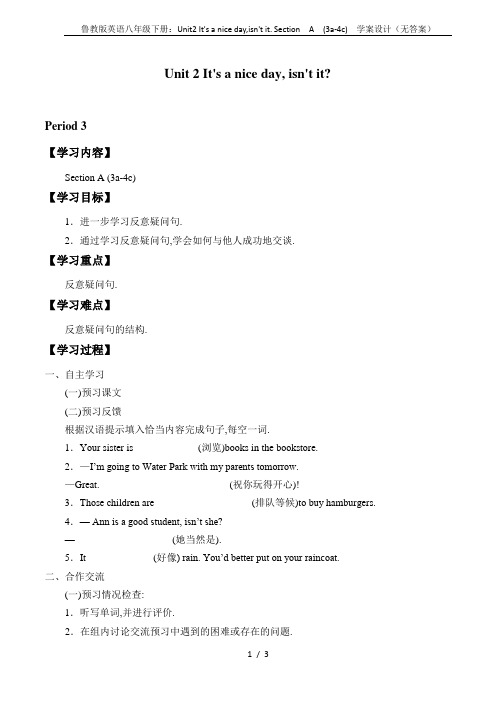
Unit 2 It's a nice day, isn't it?Period 3【学习内容】Section A (3a-4c)【学习目标】1.进一步学习反意疑问句.2.通过学习反意疑问句,学会如何与他人成功地交谈.【学习重点】反意疑问句.【学习难点】反意疑问句的结构.【学习过程】一、自主学习(一)预习课文(二)预习反馈根据汉语提示填入恰当内容完成句子,每空一词.1.Your sister is ______ ______(浏览)books in the bookstore.2.—I’m going to Water Park with my parents tomorrow.—Great. ______ ______ ______ ______(祝你玩得开心)!3.Those children are ______ ______ ______(排队等候)to buy hamburgers.4.—Ann is a good student, isn’t she?—______ ______ ______ (她当然是).5.It ______ ______ (好像) rain. You’d better put on your raincoat.二、合作交流(一)预习情况检查:1.听写单词,并进行评价.2.在组内讨论交流预习中遇到的困难或存在的问题.(二)合作探究1.完成3a.3c.2.小组活动,完成4c.三、达标测评(一)基础题单项选择( )1.—Do you think it will stop raining________ noon?—Well, it is really hard to say.A.in B.by C.at D.for( )2.—This is great weather, isn’t it?—It sure is .But it’s a little hot _______me.A.to B.on C.with D.for( )3._______fun it is to swim in the sea on such a hot day.A.what a B.what C.How much D.How a( )4.What____ fine weather today!A.a B./ C.the D.an( )5.He went to the station, _______?A.wasn’t he B.did he C.didn’t he D.was he( )6.Before you answer these questions, you’d better _____them first.A.look after B .look for C.look up D.look through( )7.—Have you bought the camera?—No, I can’t afford it. The price is a bit too____, I think.A.low B.high C.cheap D.expensive(二)能力题根据汉语完成句子.1.他快速地看了课文,然后回答了问题.He _______ __________the text quickly and then answered the question.2.雨停了.It has ________ _____________.3.他一定会给你写信的.He is ________ ______ _______to you.4.那所房子的价格很高.The ________ _________that house is _______ _________.(三)拔高题句型转换.1.Rita got a birthday present. (完成反意疑问句)Rita got a birthday present, _________ ________?2.The digital camera is 6,000 yuan. (对划线部分提问)_______ _______ is the digital camera?3.I don’t think the novel is interesting. (反意疑问句)I don’t think the novel is interesting, ________ ________?4.It is great weather, isn’t it? (改为感叹句)_________ _______ _______ it is!5.Don’t play in the street. (完成反意疑问句)Don’t play in the street, ______ _______?四、布置作业1.巩固作业:根据4b的对话,各编出一个对话.2.预习。
鲁教版(五四制)英语 八年级下册 Unit 2 It's a nice day isn't it_
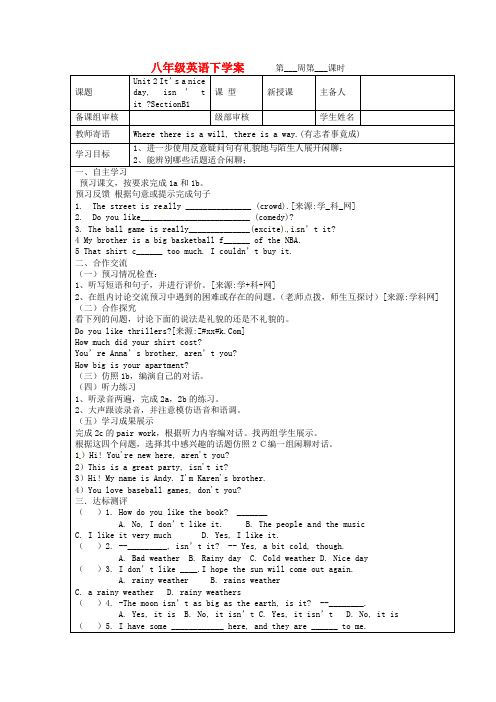
2、能辨别哪些话题适合闲聊;一、自主学习预习课文,按要求完成1a和1b。
预习反馈根据句意或提示完成句子1. The street is re ally _______________ (crowd).[来源:学_科_网]2. Do you like_________________________ (comedy)?3. The ball game is really______________(excite),i sn’t it?4 My brother is a big basketball f______ of the NBA.5 That shirt c______ too much. I couldn’t buy it.二、合作交流(一)预习情况检查:1、听写短语和句子,并进行评价。
[来源:学+科+网]2、在组内讨论交流预习中遇到的困难或存在的问题。
(老师点拨,师生互探讨)[来源:学科网] (二)合作探究看下列的问题,讨论下面的说法是礼貌的还是不礼貌的。
Do you like thrillers?[来源:Z#xx#]How much did your shirt cost?You’re Anna’s brother, aren’t you?How big is your apartment?(三)仿照1b,编演自己的对话。
(四)听力练习1、听录音两遍,完成2a,2b的练习。
2、大声跟读录音,并注意模仿语音和语调。
(五)学习成果展示完成2c的pair work,根据听力内容编对话。
找两组学生展示。
根据这四个问题,选择其中感兴趣的话题仿照2C编一组闲聊对话。
1)Hi! You're new here, aren't you?2)This is a great party, isn't it?3)Hi! My name is Andy. I'm Karen's brother.4)You love baseball games, don't you?三.达标测评()1. How do you like the book? _______A. No, I don’t like it.B. The people a nd the musicC. I like it very muchD. Yes, I like it.()2. --_________, isn’t it? -- Yes, a bit cold, though.A. Bad weatherB. Rainy dayC. Cold weatherD. Nice day()3. I don’t like ____.I hope the sun will come out again.A. rainy weatherB. rains weatherC. a rainy weatherD. rainy weathers()4. -The moon isn’t as big as the earth, is it? --________.A. Yes, it isB. No, it isn’tC. Yes, it isn’tD. No, it is()5. I have some ____________ here, and they are ______ to me.A. friends, friendB. friendly, friendlyC. friend, friendD. friends, friendly()6. Today is my _________ birthday.A. 15B.15thC.15 years oldD.15—years old()7. I want Tom to ______ me _______ my English.A. get, re adyB. help, withC. argue, withD. wait, for()8. Are you _______ with your students quite well in your new school?A. get alongB. get ting alongC. come alongD. comin g along()9.He is good at _______ English.A. speakB. speakingC. spokeD. talking()10. Her mother is very ki nd. She gets on well ______ anybody.A.atB. withC. ofD. by()11. Li Jun always makes his little sister ______ .A.cryingB.to cryC.cryD.cried()12.---What do you think of your Junior Middle School life?---I think it is colorful,______ I am always busy.A.ifB.thoughC.whileD.until()13.---How much did the handbag? ---It's about 200 yuan.A.payB.spendC.costD.take()14.---You've always been in this school,haven't you?---______ .I started here last year.A.Yes,I haveB.No,I haveC.Yes,I haven'tD.No,I haven't()15.He learns ______ English on TV ______ .A.every day;everydayB.everyday;every dayC.every day;every dayD.everyday;everyday(二)能力题根据首字母和汉语意思完成句子1. Bill is a football f_________.2. You should write a thank-you n_______ to him.3. Please be quiet. The b________ is sleeping.4. In the morning the t_________ is very busy.5. It’s going to rain. You’d better take an u________ with you.。
鲁教版(五四制)英语 八年级下册 Unit 2 It's a nice day isn't it_
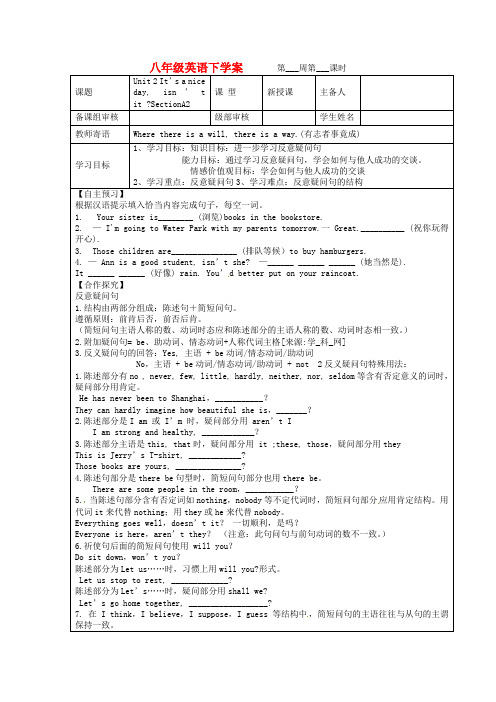
2、学习重点:反意疑问句3、学习难点:反意疑问句的结构【自主预习】根据汉语提示填入恰当内容完成句子,每空一词。
1. Your sister is________ (浏览)books in the bookstore.2. — I'm going to Water Park with my parents tomorrow.一Great.__________ (祝你玩得开心).3. Those children are_______________ (排队等候)to buy hamburgers.4. — Ann is a good student, isn’t she? —______ ______ ______ (她当然是).It ______ ______ (好像) rain. You’d better put on your raincoat.【合作探究】反意疑问句1.结构由两部分组成:陈述句+简短问句。
遵循原则:前肯后否,前否后肯。
(简短问句主语人称的数、动词时态应和陈述部分的主语人称的数、动词时态相一致。
)2.附加疑问句= be、助动词、情态动词+人称代词主格[来源:学_科_网]3.反义疑问句的回答:Yes, 主语 + be动词/情态动词/助动词No,主语 + be动词/情态动词/助动词 + not 2反义疑问句特殊用法:1.陈述部分有no , never, few, little, hardly, neither, nor, seldom等含有否定意义的词时,疑问部分用肯定。
He has never been to Shanghai,___________?They can hardly imagine how beautiful she is,_______?2.陈述部分是I am 或 I’m 时,疑问部分用 aren’t II am strong and healthy, ____________?3.陈述部分主语是this, that时,疑问部分用 it ;these, those,疑问部分用theyThis is Jerry’s T-shirt, ____________?Those books are yours, _______________?4.陈述句部分是there be句型时,简短问句部分也用there be。
鲁教版初中英语54学制八下Unit2 It's a nice day, isn't it
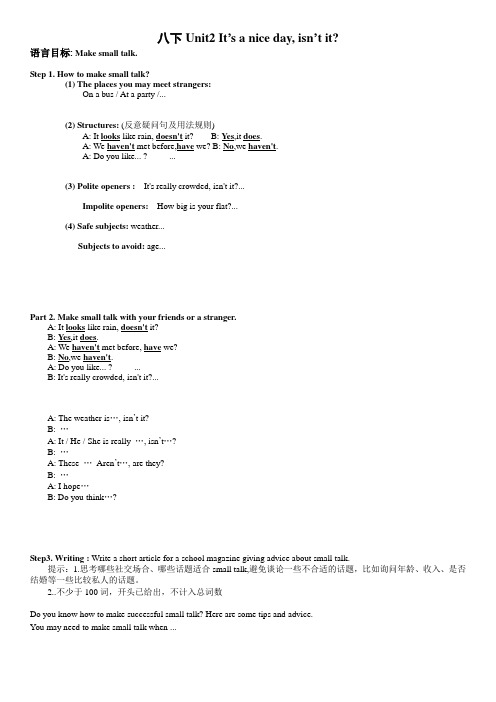
八下Unit2 It’s a nice day, isn’t it?语言目标: Make small talk.Step 1. How to make small talk?(1) The places you may meet strangers:On a bus / At a party /...(2) Structures: (反意疑问句及用法规则)A: It looks like rain, doesn't it? B: Yes,it does.A: We haven't met before,have we? B: No,we haven't.A: Do you like... ? ...(3) Polite openers : It's really crowded, isn't it?...Impolite openers: How big is your flat?...(4) Safe subjects: weather...Subjects to avoid: age...Part 2. Make small talk with your friends or a stranger.A: It looks like rain, doesn't it?B: Yes,it does.A: We haven't met before, have we?B: No,we haven't.A: Do you like... ? ...B: It's really crowded, isn't it?...A: The weather is…, isn’t it?B: …A: It / He / She is really …, isn’t…?B: …A: These …Aren’t…, are they?B: …A: I hope…B: Do you think…?Step3. Writing : Write a short article for a school magazine giving advice about small talk.提示:1.思考哪些社交场合、哪些话题适合small talk,避免谈论一些不合适的话题,比如询问年龄、收入、是否结婚等一些比较私人的话题。
鲁教版英语八年级下册Unit 2 Its a nice day isnt it Section
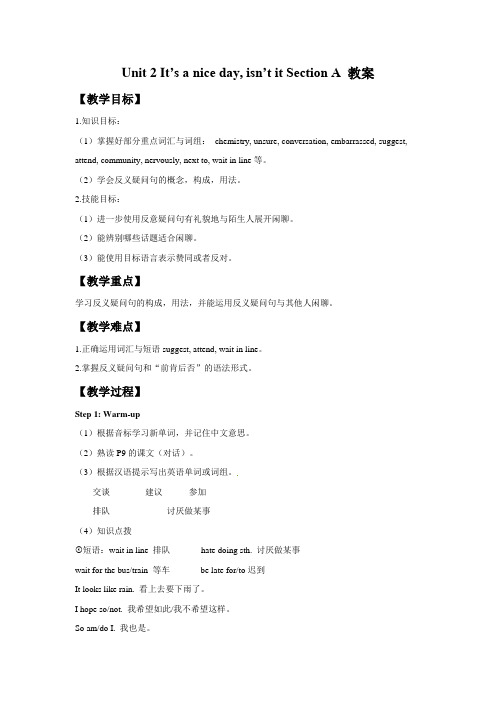
Unit 2 It’s a nice day, isn’t it Section A 教案【教学目标】1.知识目标:(1)掌握好部分重点词汇与词组:chemistry, unsure, conversation, embarrassed, suggest, attend, community, nervously, next to, wait in line等。
(2)学会反义疑问句的概念,构成,用法。
2.技能目标:(1)进一步使用反意疑问句有礼貌地与陌生人展开闲聊。
(2)能辨别哪些话题适合闲聊。
(3)能使用目标语言表示赞同或者反对。
【教学重点】学习反义疑问句的构成,用法,并能运用反义疑问句与其他人闲聊。
【教学难点】1.正确运用词汇与短语suggest, attend, wait in line。
2.掌握反义疑问句和“前肯后否”的语法形式。
【教学过程】Step 1: Warm-up(1)根据音标学习新单词,并记住中文意思。
(2)熟读P9的课文(对话)。
(3)根据汉语提示写出英语单词或词组。
交谈建议参加排队讨厌做某事(4)知识点拨短语:wait in line 排队hate doing sth. 讨厌做某事wait for the bus/train 等车be late for/to迟到It looks like rain. 看上去要下雨了。
I hope so/not. 我希望如此/我不希望这样。
So am/do I. 我也是。
反意疑问句又叫附加疑问句,是在陈述句后,对陈述句所叙述的事实提出的疑问。
其基本结构有两种:一是“肯定陈述句+简略否定问句”;二是“否定陈述句+简略肯定问句”。
反意疑问句的前后两部分在时态、人称和数上都要保持一致。
如:It looks like rain, doesn’t it?Step 2: Practice(1)听写或读出本课时的重点单词。
(2)互相讨论反义疑问句的构成、概念,然后试一试把下列句子变成反义疑问句。
- 1、下载文档前请自行甄别文档内容的完整性,平台不提供额外的编辑、内容补充、找答案等附加服务。
- 2、"仅部分预览"的文档,不可在线预览部分如存在完整性等问题,可反馈申请退款(可完整预览的文档不适用该条件!)。
- 3、如文档侵犯您的权益,请联系客服反馈,我们会尽快为您处理(人工客服工作时间:9:00-18:30)。
教师寄语: .1.A young idler(懒汉), an old beggar(乞丐). 少壮不努力,老大徒伤悲。
2.Great hopes make great
mt 2
Section B (1a-1e)
1.What is small talk?
2.Where can we make small talk?
3.Practice tag questions.
Find out the questions you think are polite ( ) or impolite ( ) small talk with the people you don’t know.
花费某人···钱去做某事。 It cost me two hundred yuan to buy the sweater. cost n. 代价,价格,费用 c/u The cost of(···的费用) living in a big city is very high. The cost of (···的价格)the car is 120,000 yuan.
Do you like action movies?
Do you like comedies?
You’re Anna’s brother, aren’t you?
cost v.花费(金钱,时间,劳力等) cost cost 是过去式和过去分词。 句式:1.sth. costs (sb.) some time/some money.
Where? at a party at school at a ball game
1d Listen again. Match each question with the correct answer.
1一. Y,ou无’r生e J命en的ny物’s体fr加ien'sd所, a有re格n’的t y用ou法? 。d 2p1eg.l用a.Styoo于m,atn表oeylrlr示sompw时oe'rsa间tswb?o的eua名tthye词oru后rs;etlef,nRmitian.uDteos'yborueakf. 32.用W于ha表t d示o国yo家u t、hi城nk市o、f th团e体sc名ho词ol?后c: Questions 4eg. Y.Aomue’vrieca'lswpaoylsicby(e政en策in) thJiixsi`sscphopoul,lahtaiovnen’t b y3o.用u?于度量衡或价钱名词后: 5te.nItk’silormeaeltlyercsr' odwisdtaendc,ei(s距n’离t it)? twa enty dollars' 6va. lDueid(价yo值u )see Friday night’s game on TV? e 二,play sports的同义词 a. Yetsa,kiet iesx.eArcriesey,ouexaerbcaislel gv.a锻m炼e fan? b. Noe,xIehrcaisveenn’.t练. I习stacrt操ed练hecre last year. Answers c. It’dsogrsoeamt.e English exercises d. Yeds,oImamor.nMingy enxaemrceisiessRita. e. Yes, I did. It was really exciting, wasn’t it?
f. Yeah! I play tennis and ping-pong.
Role play a small talk conversation. You can choose one of the openers below.
1. Hi! You’re new here, aren’t you? 2. This is a great party, isn’t it? 3. Hi! My name’s Andy. I’m Karen’s brother. 4. You love baseball games, don’t you?
Homework
1.Master the language points that we learned in this class. 2.We should know where we can make small talk and what we should talk about. 3.Preview the new words on page14, Para.A and B.
I have paid for the pen. 我已付了笔钱。
4.How much did that shirt cost ? =How much was that shirt? =What was the price of that shirt? 5.What do you think of the school? 你认为这所学校怎么样? =How do you like the school? =What do you think about the school? 6.A ball game fan 一个球迷 7.Friday night's game 周五晚上的比赛 8.play sports 做运动 9.make small talk 进行闲聊 10.at a ball game 在球赛场
How much did that shirt cost?
How much do they pay you?
How old are you?
Practice the conversation with your partner. A: Do you like action movies? B: No, but I love comedies.
某物(某事)花费(某人)···时间或···钱。 eg. The sweater cost me two hundred yuan. Such a difficult job costs a lot of time and effort(心力). 2.It costs sb.some money to do sth.
homework everyday. 4.I _p_a_id___ (花费)200 yuan for the sweater yesterday. 5.It took us twenty minutes ___to__w_a_l_k__(walk)
to school. 6.This is __t_o_d_a_y_'s__(今天的)newspaper. 7.This is __e_x_c_it_in_g__(令人兴奋的)news. 8.I am ____e_xc_it_e_d__(感到兴奋的)about the
随堂小测
1.It cost me 2000 yuan _t_o_b_u_y_(buy) a bike .
2.He spent 100 yuan __r_e_pa_i_ri_ng____(repair) the watch.
3.She spends two hours ___d_o_in_g___(do) her
breakfast,_d_o__th_e_y_______? 5.Tom has been to Singapore twice,__h_a_s_n_`_t _h_e____?
6.It`s going to rain,__is_n_`t_i_t_____?
7.You aren`t a worker,__a_r_e_y_o_u____? 8.Mike studies very hard,_d_o_e_s_n_`_t _h_e__?
反意疑问句的用法; 反意问句记四点,前后谓语正相反; 时态必须要一致,人称不能不统一; 短句not 如出现,必须缩写是习惯; 最后一点莫忘记,短句主语代词替。
1.He can speak chinese,__c_a_n_`t_h_e_____? 2.He never gets up late,__d_o_e_s__h_e______? 3.Please take care of my cat,__w_i_ll_y_o_u____? 4.Mr.Smith and his wife seldom have bread for
某物花费某人……钱。 A new computer cost me a lot of money. 一台电脑花了我很多钱。 (2) It costs sb.some money to do sth.
做某事花费某人多少钱。 It cost me twenty yuan to buy a pen。 花费我二百元买了一支笔。
E.g.
A: This is a great party, isn’t it? B: Yes, it is.
A: It is a nice picture, isn’t it? B: Yes, it is.
Useful laguage points in this class
1.cost .v 花费 过去式和过去分词是cost (1) sth. costs sb.some money .
。
2.spend v. 花费,过去式和过去分词是spent.此词 的主语只能是人,既可以表示花时间也可以表示花钱。 常用句式如下, (1) sb. spends some time 或some money (in)doing. sth. 某人花一段时间或一些钱做某事。 (2)Sb.spends some time or some money on sth. 某人在某事上花费多少时间或多少钱。 They spent two years in building (on)the bridge. 他们花费两年的时间修这座桥。 3. pay v. 的基本用法。pay的主语也是人,是付钱, 花费的意思。过去式和过去分词是paid. 常用句式。 (1)sb. pays some money for sth.某人付钱买某物。 (2)pay for sth. 付……的钱 赔偿
